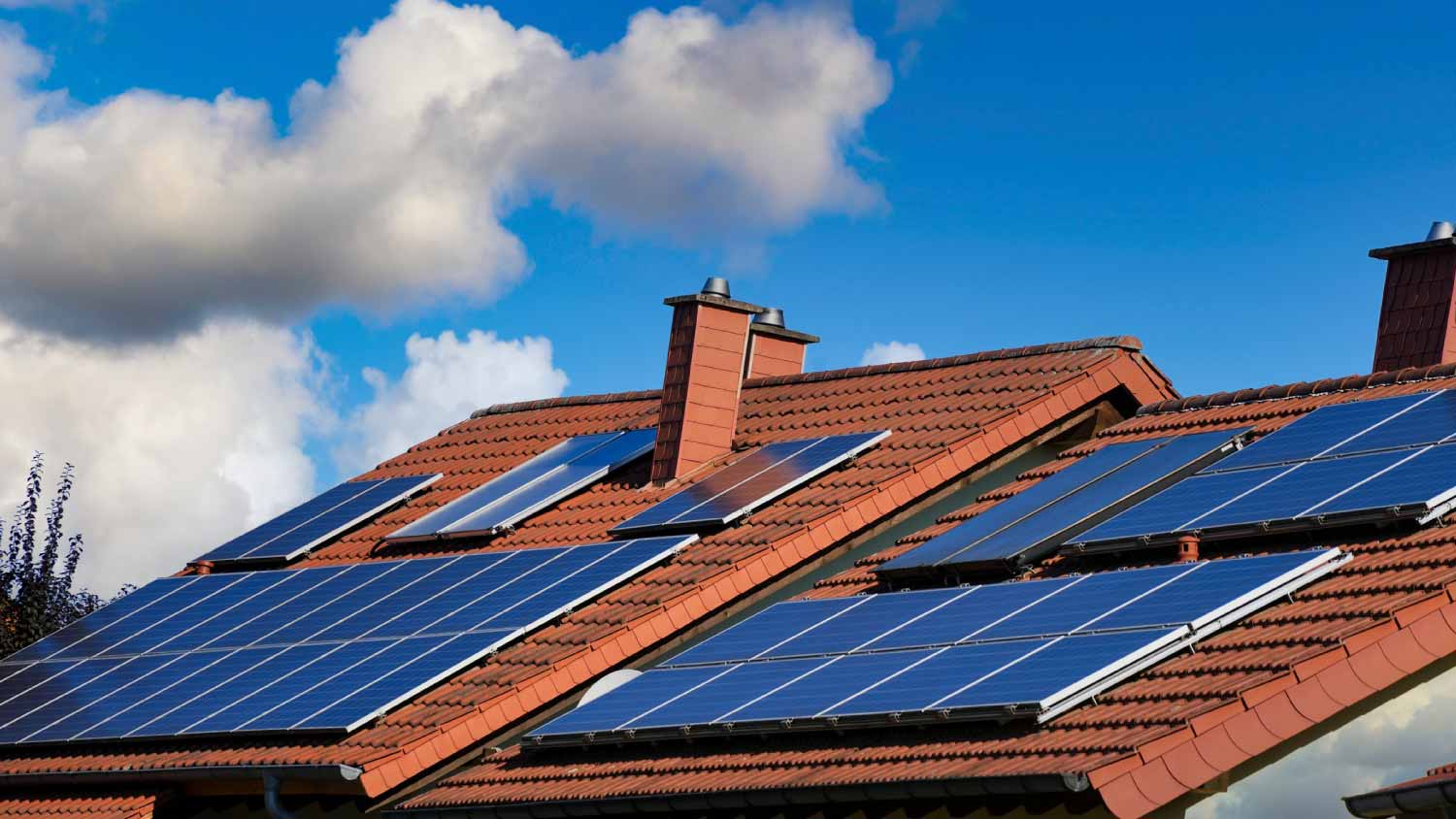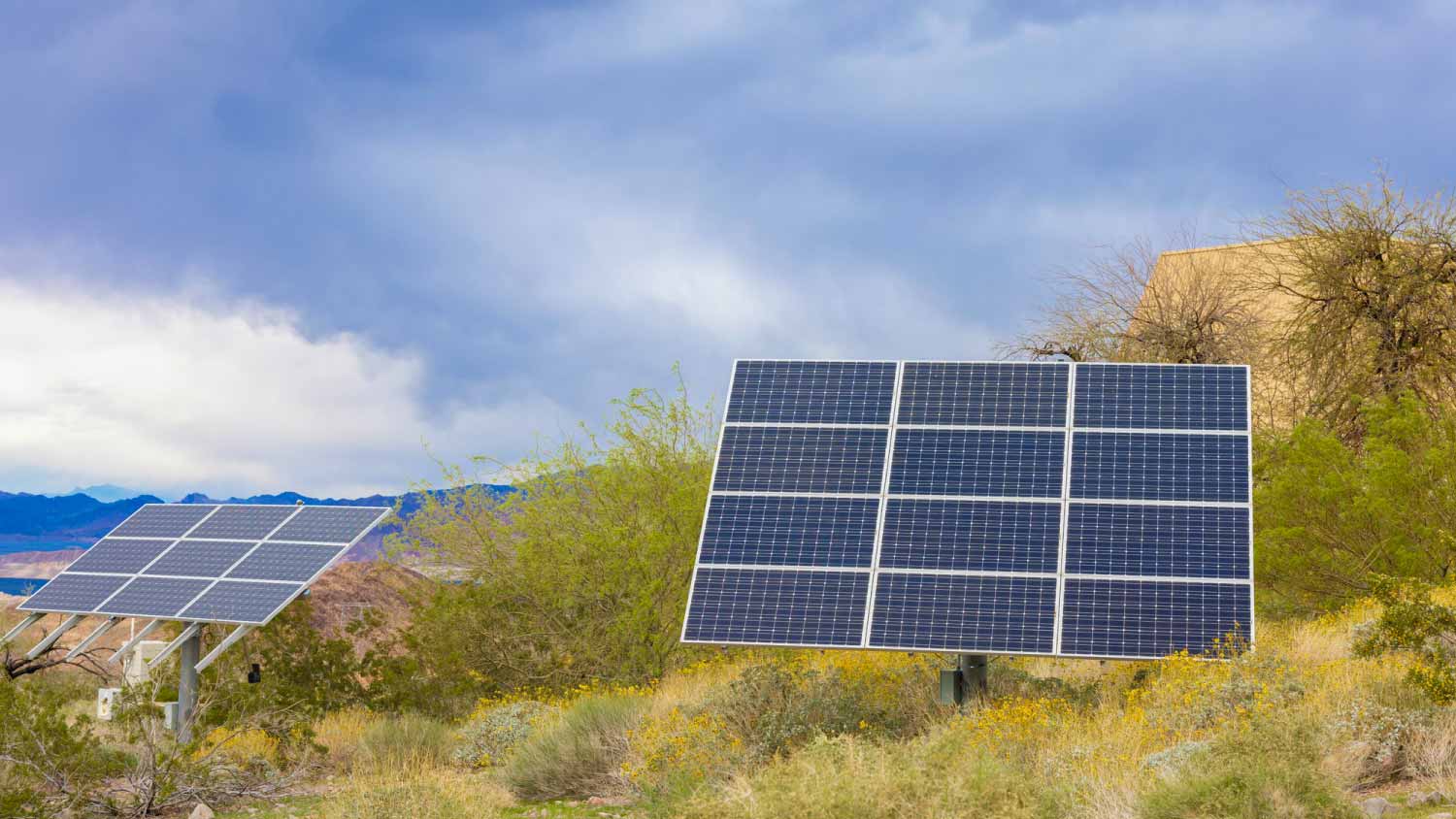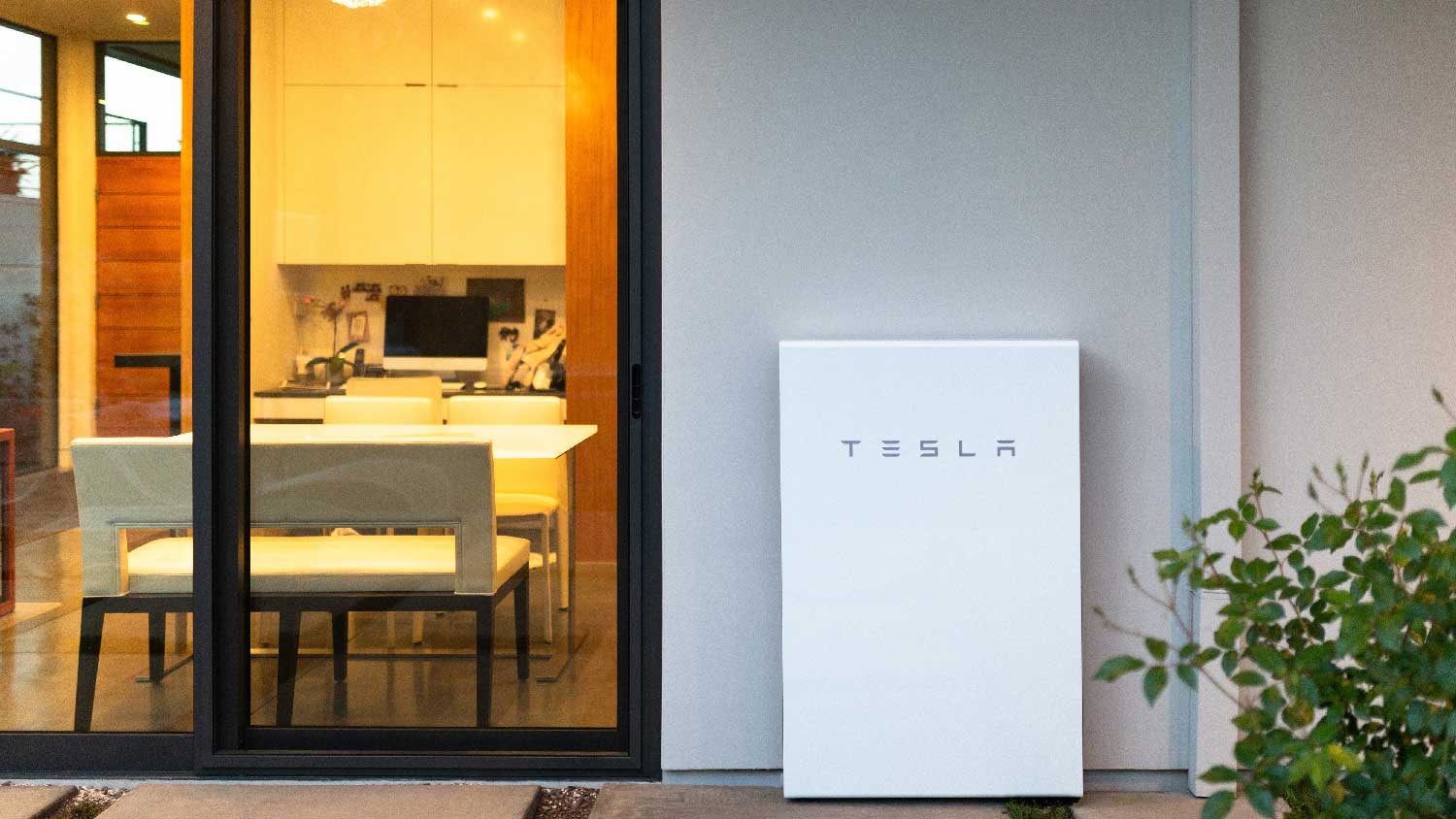
Solar battery costs depend on the size of your system, labor, and capacity. Learn how much you could pay for batteries for home solar systems.
Are solar panels worth climbing for?


Ground-mounted solar systems are best for homes with roofs unsuitable for solar panels.
Roof-mounted solar panels are better for homeowners who want lower up-front costs, but roof repairs can increase costs.
Ground-mounted solar panels cost an average of $40,000 after the solar tax credit, while roof-mounted panels cost $27,200.
Whether you’re looking to increase your home’s value or take the leap into renewable energy, where you install your solar panels can make a difference. Different mounting options are better suited for different properties, but the choice between solar panels on the ground versus a roof-mounted system can feel overwhelming. This guide breaks down the key differences, so you’ll know which mounting system fits your needs.
The main difference between ground- and roof-mounted solar panels is the location you choose to install them in. Much like it sounds, ground-mounted solar systems are installed on the ground, and roof-mounted systems are installed on the home's roof. Whether you want them up and out of the way on the roof or anchored to the ground changes installation procedures and space planning on your property.
Ground-mounted solar panels are installed at ground level instead of on a roof. They sit on structures anchored into the ground, allowing them to stand independently of other structures.
This setup requires a location on the property where sunlight reaches the ground and won’t interfere with existing buildings. It also requires ample space on your property, as it can be quite large.
Ground-mounted systems are chosen for their flexibility when a home’s roof is not a feasible option for roof-mounted panels. Here are the common types of ground-mounted solar panel systems:
Fixed-Tilt Systems: As a standard mounting system, solar panels are placed on metal framing that is set up at a fixed angle.
Single-Axis Tracking Systems: Single-axis tracking systems are pole-mounted systems that tilt and rotate your solar panels throughout the day to follow the sun.
Dual-Axis Tracking Systems: Dual-axis tracking systems take single-axis tracking systems one step further, as they can adjust your solar panels’ position based on the season.
After the federal solar tax credit, ground-mounted solar panels cost about $40,000 for the average U.S. household, depending on the size of the system you choose.
| Pros | Cons |
|---|---|
| Easier maintenance | Takes up space |
| More customization options | Higher installation costs |
| Unrestricted by roof angles | Can require planning permission |
Best for:
Homes with large, unused yard space
Homeowners who want easier access for maintenance or repairs
Homes with roofs that are unsuitable for solar panels
Ground-mounted solar panels offer several advantages, including optimal sunlight exposure. The solar panels are not restricted to roof angles, and they can be installed at the perfect tilt to capture the most sunlight. You can also choose between fixed-tilt and tracking systems.
Additionally, ground-mounted solar panels are easier to clean and maintain without the risk of climbing onto a roof.
Despite the benefits, ground-mounted solar panels have a few drawbacks. The most significant is the space requirement. These systems need ample space in direct sunlight where they won’t interfere with other buildings on the property.
Depending on where you live, you might need to obtain planning permission before the installation. The higher installation costs could also impact your decision. Hire a local solar panel installer who can recommend the best placement and setup for your solar installation.

Roof-mounted solar panels are installed directly on the roof of a home or building. These are most likely what you picture when first hearing “solar panels,” as they’re the most common type of solar panel system. The panels are secured with mounting hardware that attaches to the roof’s surface.
Roof-mounted solar panels make efficient use of space and come with lower installation costs. Solar panels can also be installed on various roof types, including asphalt shingle, metal, and flat roofs. You can use a fixed-tilt system to set up your panels at a fixed angle on flat roofs.
After the federal tax credit, roof-mounted solar panels cost around $27,200, depending on roof conditions, labor costs, and how many solar panels you need.
| Pros | Cons |
|---|---|
| Space-saving installation | Limited by roof size and condition |
| Aesthetically pleasing | Harder to access |
| Lower installation costs | The amount of sunlight panels receive is dependent on the angle |
Best for:
Homes with limited yard space
Homeowners who want lower up-front costs
Homes with roofs that get adequate sunlight exposure
Roof-mounted solar panels provide advantages like optimal space efficiency. Since they utilize unused roof space, they’re ideal for homes without large outdoor areas.
They’re more cost-effective than ground-mounted systems. Since the roof serves as a natural foundation, there’s no need to build additional support structures, reducing solar panel materials and labor costs.
Roof-mounted solar panels have a few disadvantages. The most notable drawback is that not all roofs are suitable for solar panels. If your roof is in poor condition or too steep, you’ll need to invest in roof maintenance or replacement.
Another concern is that solar panels are difficult to maintain and clean when you have to access the roof, also complicating solar inspections or repairs.
When considering solar panels, you’ll need to assess your roof's age, size, pitch, and shape. The trees shading your home will also impact whether rooftop solar panels are the best option. A solar panel installation pro can assess your roof and recommend the next steps.

Now that you know the specifics of on-ground versus roof-mounted solar panels, here’s how the two stack up against each other.
Roof-mounted panels look sleek as they integrate into your roof. They’re up and out of the way, leaving your yard untouched. There’s no impact on your landscaping or ground-level space, so you can have a garden, play areas, or room for outdoor entertainment. Ground-mounted panels are more visually prominent and can occupy a good part of your yard.
Ground-mounted panels have different options, such as tracking systems, so you can capture as much sunlight as possible year-round and increase your energy production. The ground setup allows you to easily make panel upgrades and system expansions, whereas roof mounts are more challenging to access.
Roof-mounted systems are less expensive because installers don’t have to build a foundation for the panels. You won’t need the support poles or mounting frameworks that ground systems require, significantly reducing material and labor costs.
Ground-mounted systems are easier to install, maintain, and repair since they don’t require climbing on the roof. It also makes DIY tasks like snow removal and cleaning solar panels easier, meaning you’ll save on service and maintenance costs over the system’s lifetime.
No matter where you install your solar panels, they have an estimated life span of 25 to 30 years with proper care. The panels will face similar environmental exposures and degradation rates regardless of where you mount them, but regular maintenance and quality components help prolong their life and efficiency.
Both systems are equally eco-friendly, as you can’t beat a system that converts sunlight into clean, renewable energy. The manufacturing and installation processes carry similar environmental impacts regardless of placement, so both options benefit the planet and your wallet.
From average costs to expert advice, get all the answers you need to get your job done.

Solar battery costs depend on the size of your system, labor, and capacity. Learn how much you could pay for batteries for home solar systems.

Discover the Tesla Powerwall installation cost, including average prices, cost factors, and tips to help homeowners budget and save on their Powerwall project.

There are a few factors to consider when it comes to solar panel repair costs. This guide breaks down the prices of solar panel removal, repair, and replacement.

There are three main types of solar batteries, but which one is best for your home? We’ll walk you through the different types and how to make your decision.

Even the best solar panels don’t last forever. This guide will help you understand how long solar panels last and how to make the most of their lifespan.

Most solar panel installations require a pro, but you can still learn how to install solar panels. Read this guide to install solar panels like a pro.